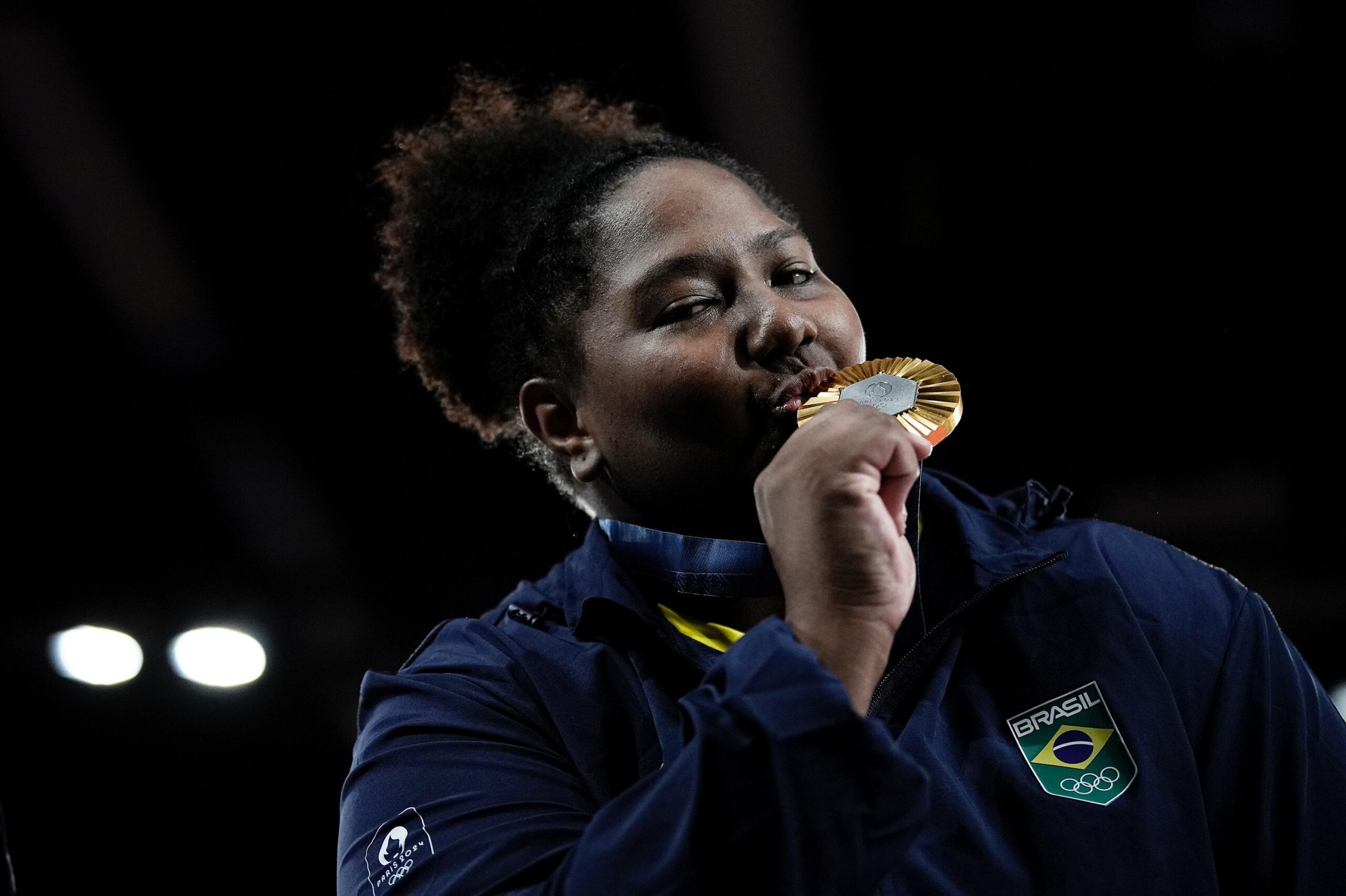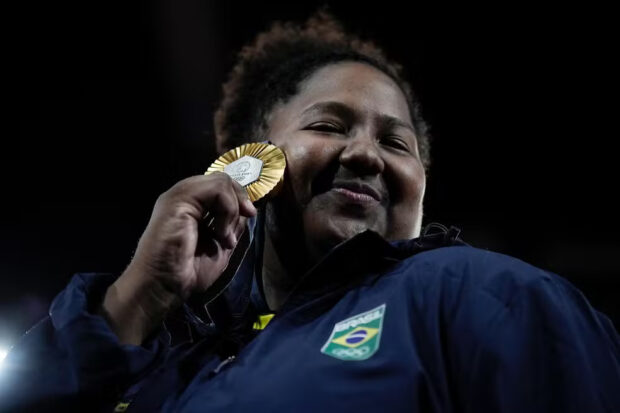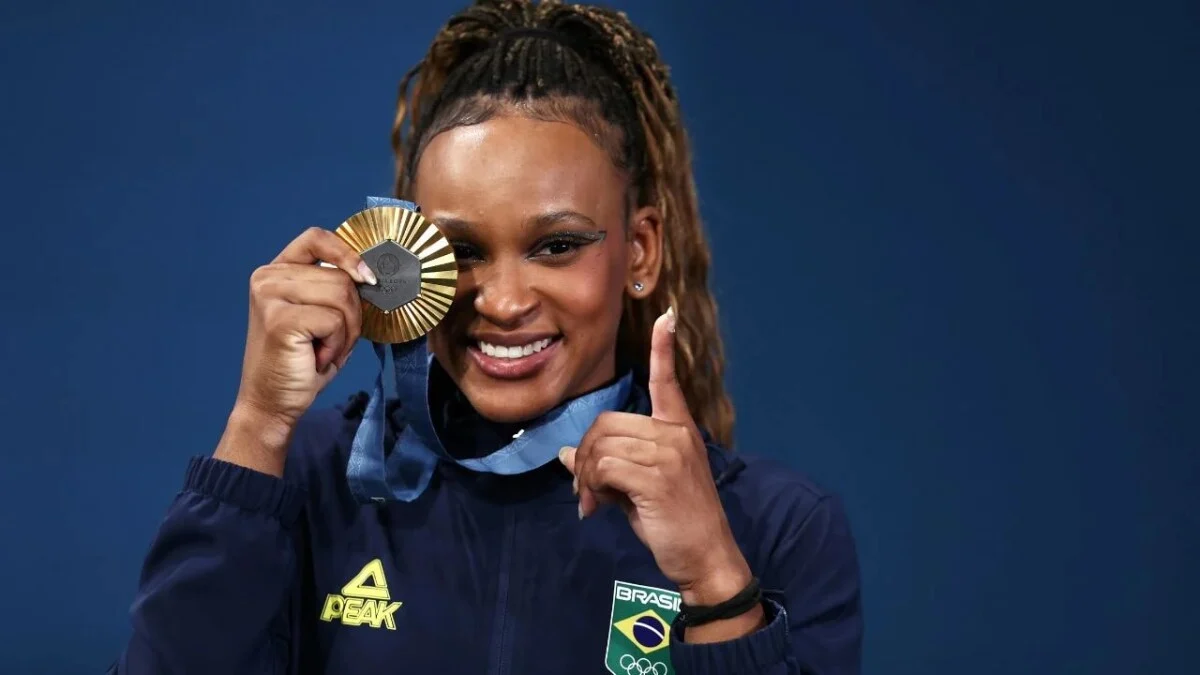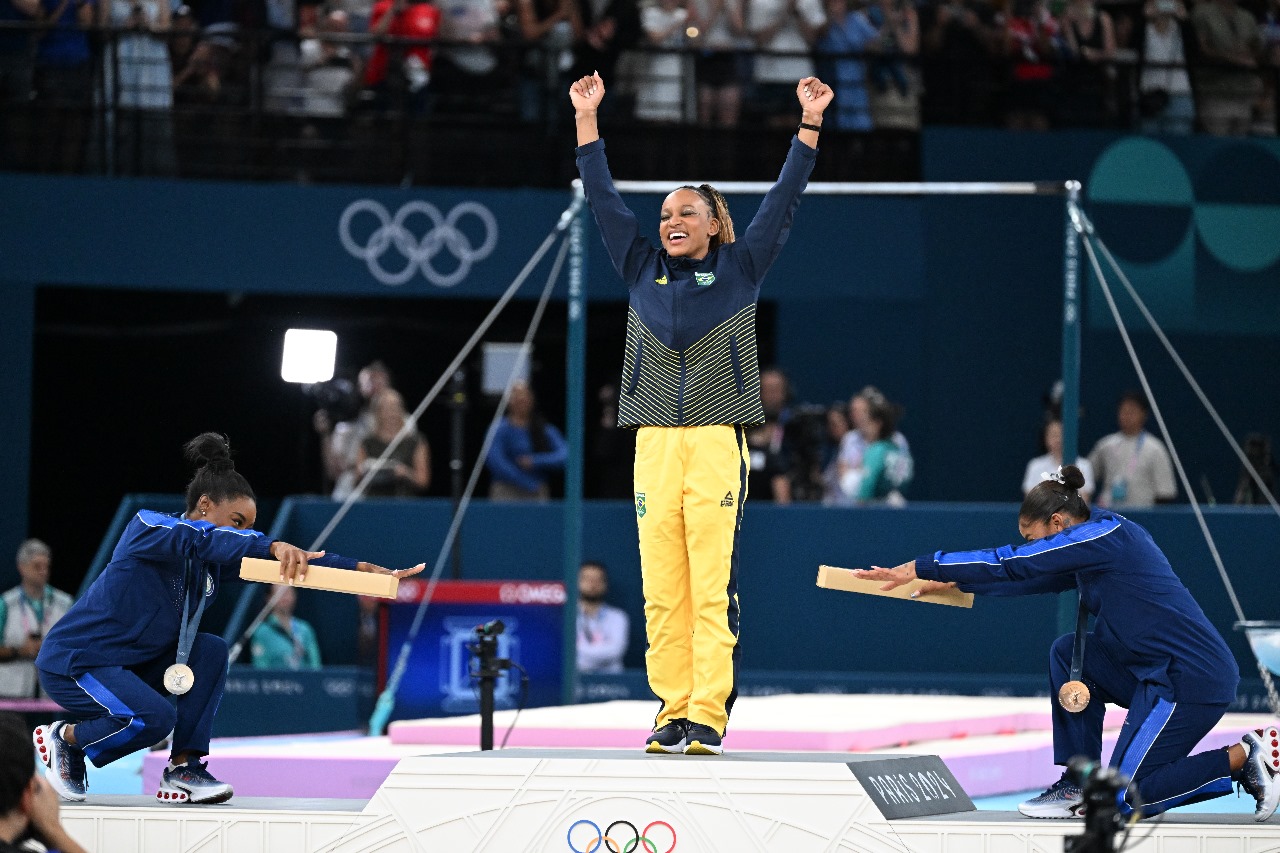
This is Part 1 of a two-part article on the achievements of representation for Black Brazilian women at the 2024 Olympics.
The Olympic Games have a complicated and often harmful history for the cities chosen as hosts, but they also offer key moments for shaping the public’s perception of certain groups, fostering inclusion, and highlighting that high performance in Olympic sports is only achieved with public and political investment.
At the Paris 2024 Games, Brazil won three gold medals, all of which were earned by Black women and which are a testament to community programs and public policies that invest in sports and athletes. These gold medal winners are Beatriz Souza in judo, Rebeca Andrade in gymnastics floor exercise, and the duo Duda Lisboa and Ana Patrícia Ramos in beach volleyball. This dominance by women is not new to Brazil’s Olympic history; at the 2021 Tokyo Olympics, the victorious presence of Black Brazilian athletes among medalists had already drawn attention.
Beatriz Souza: Brazil’s First Gold at the 2024 Paris Olympics

Brazil’s first gold medal at the 2024 Olympics came in the women’s +78kg judo weight class, thanks to Souza, a Black, plus-size woman born in Peruíbe on the coast of São Paulo. This achievement not only brought pride to Brazil but highlighted Souza as living proof that plus-size individuals can be athletic, high-performance athletes and Olympic champions.
Souza represents the daily struggle against barriers such as race, gender, and fatphobia in sports. Her victory stands as a symbol of hope for many young Black plus-size women who dream of making their mark in sports. She inspires new generations to believe that achieving great things is possible, regardless of color, background, gender, or weight.
Shortly after winning the gold, Souza touched the hearts of Brazilians with a video call to her family:
“I did it! I did it! It happened, mom! It worked, dad! I did it! This is for grandma; it’s for grandma, mom. I love you all more than anything. I love you!”
Souza is a recipient of the Athlete Scholarship, a public policy initiative from the Ministry of Sports aimed at supporting high-performance athletes. Like many Afro-Brazilians, Souza began her athletic career through a social project in her community: the Peruíbe Budokan Judo Association. Founded by Sensei Samuel Lopes, the project offers free judo classes to children in vulnerable situations.
Souza’s victory highlights a growing movement to value and give visibility to Black women in various spheres of society. One impact of her win was the significant increase in her social media following after she won the gold, reflecting recognition of her achievements as an athlete and her role as an inspiration.
Rebeca Andrade: The Power of Black Representation

Rebeca Andrade made her mark at the 2024 Olympic Games as the second athlete to win gold for Brazil. The 25-year-old gymnast from Guarulhos, a city in the Greater São Paulo area, is considered the top athlete in the floor exercise in Brazil and one of the best in the world. She received a gold medal in the vault and a silver in the all-around in the Tokyo Olympics in 2021, and in 2024 she raised the bar even higher, taking home a gold in the floor routine, a silver in the vault, a silver in the all-around, and bronze in the team all-around.
In a historic floor exercise podium, Andrade was joined solely by Afro-diasporic gymnasts: Simone Biles in second place and Jordan Chiles in third, both of whom are African-American. This was the first all-Black podium in Olympic gymnastics, a sport historically dominated by white athletes.

However, days later, the Romanian team filed a request to review the results, and Romanian athlete Ana Maria Bărbosu was declared the third-place finisher. This decision, which has been declared final, required Chiles to return her bronze medal. Many interpreted this as a lack of fair play on the part of the athlete, the Romanian team, and the federation as a whole. After facing criticism, the Romanian Federation suggested that the bronze medal be shared among Chiles (who dropped to fifth place after the Romanian appeal), Ana Maria Bărbosu (now declared third), and Sabrina Maneca-Voinea (another Romanian athlete, declared fourth). Despite the Romanian proposal, Chiles was required to return the medal, which was then awarded to Bărbosu ten days after the Paris podium in a ceremony held in Bucharest, the capital of Romania.
In light of Andrade’s numerous victories, Internet users resurfaced an old video of her training in Guarulhos alongside Daiane dos Santos. Dos Santos, now 41, is widely regarded as the pioneer of the floor exercise in Brazilian gymnastics. There could have never been a Rebeca Andrade without a Dos Santos. Andrade’s Olympic triumph highlights the importance of representation, especially in a predominantly white sport like artistic gymnastics.
After the Paris Games, Andrade officially became Brazil’s most decorated Olympic medalist. The Brazilian who has won the most Olympic medals began her remarkable career 20 years ago through a social program in Guarulhos. Today, following her recent achievements, this same social initiative has garnered significant attention. The Sports Initiation Program – Guarulhos Artistic Gymnastics opened 425 spots for gymnastics training, and within two days, all spots were filled, with over 90 children still on the waitlist.
Duda Lisboa and Ana Patrícia Ramos Fulfill Their Dream of an Olympic Podium in Beach Volleyball
Brazil clinched the final gold medal in beach volleyball through the efforts of Duda Lisboa and Ana Patrícia Ramos. After an eight-year gap, Brazil’s beach volleyball team once again triumphed, led by two Black women. With tremendous resolve, 26-year-olds Lisboa, from the northeastern state of Sergipe, and Ramos, from Minas Gerais, captured gold at the Paris Olympics.
The pair began their athletic journeys as children, but their paths to the Olympics differed greatly. Growing up by the beach, Duda Lisboa is the daughter of professional beach volleyball player Cida Lisboa. In addition to being a player, Cida developed a social project as a coach in her hometown of São Cristóvão, Sergipe, in the Greater Aracaju area, with a training center focused on nurturing talent. Her daughter, Duda, became a prime example of this success, starting to compete at the age of 12.
Ramos, on the other hand, grew up far from the beach, in the rural town of Espinosa, located on the border between Minas Gerais and Bahia. Beginning her journey in soccer and handball, the most accessible sports in her region, her dream was to become a professional athlete. At 16, a coach recognized her potential for beach volleyball and secured a spot for her to train in Betim, a city 439 miles away. After just four months of training, she was called up to the Saquarema Training Center of the Brazilian Volleyball Confederation (CBV) and moved to Rio de Janeiro.
In recent years, both athletes faced immense pressure and disappointment after being eliminated from the Tokyo Olympics. At that time, they were paired with different partners and were defeated before reaching the semifinals. In 2022, they decided to relocate again, this time to Uberlândia, a city in the interior of Minas Gerais. Despite being far from the sea, the athletic club Praia Clube invested in the sport, and after two years of dedicated work, the team brought home the Olympic gold for Brazil.
“Please, from now on, when you talk about it, mention that we gave everything to become Olympic champions for you.” — Ana Patrícia Ramos
Lisboa and Ramos are only the second Brazilian duo in history to win gold in women’s beach volleyball. The first and only duo to have previously reached the top of the podium in the sport were Jacqueline Silva and Sandra Pires at the 1996 Atlanta Olympics.
Beatriz Souza, Rebeca Andrade, Duda Lisboa, and Ana Patrícia Ramos are role models for millions of people across Brazil and the world. Brazil’s only gold Olympic medalists are Black women from favelas and peripheral areas, the Northeast, and the interior. These medals are the result of the opportunities these athletes had. It is important to emphasize that while effort, individual dedication and natural talent are crucial for becoming Olympic champions, public policies that support exploring athletic potential are also essential for Olympic success. These four athletes demonstrate that with increased investment, Black women and people from favelas and peripheral areas can overcome any barrier and achieve greatness, even clinching gold for Brazil.
Don’t miss Part 2.
About the author: Cleyton Santanna holds degrees in journalism and screenwriting from Federal Rural University of Rio de Janeiro (UFRRJ) and the CriaAtivo Film School. He uses his YouTube channel to address oddities, ancestry, and Afro-Brazilian culture. In 2017, he produced two documentaries: “Entre Negros” (Between Blacks) and “Tudo Vai Ficar Bem” (Everything is Gonna Be OK), and was recognized as a screenwriter in 2018 by the Creative Economy Network for the short “Vandinho.” He is currently a communicator for the Museum of Tomorrow and hosts the Influência Negra podcast.
